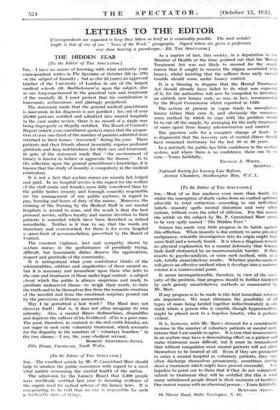LETTERS TO THE EDITOR
[Correspondents are requested to keep their letters as brief as is reasonably, possible. The most suitab!..3 length is that of one of our "News of the Week" paragraphs. Signed letters are given a preference over those bearing a pseudonym.—Ed. THE SPECTATOR.]
THE HIDDEN FEAR [To the Editor Of THE SPECTATOR.]
SIR,—I have no means of knowing with what authority your correspondent writes in The Spectator of October 5th (p. 479) on the subject of Insanity ; but as (for 20 years) an approved teacher of the University of London in one of the largest medical schools (St. Bartholomew's) upon the subject, also as' one long-experienced in the practical care and treatment of the mentally ill, I must protest that his contribution is inaccurate, acrimonious, and glaringly prejudiced.
The statement made that the general medical practitioner is inaccurate in his diagnosis is not justified ; for, out of over 23,000 patients certified and admitted into mental hospitals in the year under review, there is no record of a single case being improperly or illegally certified. The Board of Control's Report (which your contributor quotes) states that the propor- tion of over one-third of the number of patients admitted were returned to their homes recovered" during the year. These patients and their friends almost invariably express profound gratitude and deep indebtedness for their care and treatment, in .spite of the statement made that "the environment of lunacy is known to induce or Aggravate the disease." As to the reflection upon the general practitioner's knowledge, it is known that the study of insanity is compulsory in the medical curriculum..
It is not a fact that asylum nurses are meanly fed, lodged and paid. In no hospital service is the regard for the welfare of the staff (male and female) more fully considered than by the public bodies (county and borough councils) responsible for the management of our public asylums, in regard to pay, housing and hours of duty of the nurses. Moreover, the training of the Nursing by the Medical Staff in our mental hospitals is second to none, and the result is that the best personal service, selfless loyalty and sincere devotion to their patients is conceded which have been described as indeed remarkable.. Neither is it true to say that the wards are insanitary and. overcrowded, for there is for every hospital a • space-limit of accommodation, prescribed by the Board of Control.
The constant vigilance, tact and sympathy shown by Asylum nurses in the performance of peculiarly trying,' difficult, but honourable duties deserve the appreciation, respect and gratitude of the community. •
• It is unimportant what your contributor thinks of th,e whimsicalities, oddities and singularities of those around us, but it is necessary and incumbent upon those who refer to' the care and treatment of those under legal control—a subject about which the- public is always suspicious and ready to attribute undeserved blame—to weigh their words, to state the truth and tabe themselves free from the roniantic creations of the novelist and from the emotional surprises poured out by the purveyors of literary amusement:
' May I be permitted a last word ? The Mind does not discover itself: that is, it does not often recognize its own infirmity.' Also, a mental illness disfranchises, disqualifies and deprives the sufferer of his livelihood—if he is a poor man. The poor, therefore, in contrast to the rich (with friends), are not eager to seek early voluntary treatment, which accounts for the disparity in the numbers of" voluntary boarders" in the two classes.—I am, Sir, your obedient servant,














































 Previous page
Previous page